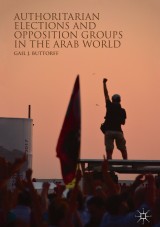Details

Authoritarian Elections and Opposition Groups in the Arab World
|
80,24 € |
|
| Verlag: | Palgrave Macmillan |
| Format: | |
| Veröffentl.: | 13.12.2018 |
| ISBN/EAN: | 9783319921860 |
| Sprache: | englisch |
Dieses eBook enthält ein Wasserzeichen.
Beschreibungen
This book examines how opposition groups respond to the dilemma posed by authoritarian elections in the Arab World, with specific focus on Jordan and Algeria. While scholars have investigated critical questions such as why authoritarian rulers would hold elections and whether such elections lead to further political liberalization, there has been comparatively little work on the strategies adopted by opposition groups during authoritarian elections. Nevertheless, we know their strategic choices can have important implications for the legitimacy of the electoral process, reform, democratization, and post-election conflicts. This project fills in an important gap in our understanding of opposition politics under authoritarianism by offering an explanation for the range of strategies adopted by opposition groups in the face of contentious elections in the Arab World.<p></p><p></p><p></p><p></p>
<div>1. Chapter 1 The Strategic Dilemma of Authoritarian Elections.- 2. Chapter 2 Explaining Election Boycotts.- 3. Chapter 3 Participation, Boycott, and Protest in Authoritarian Elections.- 4. Chapter 4 Centers of Power, Regime Strength, and Opposition Beliefs.- 5. Chapter 5 The Islamic Action Front: Between Participation and Boycotts in Jordan.- 6. Chapter 6 Opposition Boycotts in Algeria.- 7. Chapter 7 Conclusion </div>
<b>Gail J. Buttorff</b> is Visiting Assistant Professor in the Hobby School of Public Affairs at the University of Houston, USA.
<p>This book examines how opposition groups respond to the dilemma posed by authoritarian elections in the Arab World, with specific focus on Jordan and Algeria. While scholars have investigated critical questions such as why authoritarian rulers would hold elections and whether such elections lead to further political liberalization, there has been comparatively little work on the strategies adopted by opposition groups during authoritarian elections. Nevertheless, we know their strategic choices can have important implications for the legitimacy of the electoral process, reform, democratization, and post-election conflicts. This project fills in an important gap in our understanding of opposition politics under authoritarianism by offering an explanation for the range of strategies adopted by opposition groups in the face of contentious elections in the Arab World.</p><p> </p><p><b>Gail J. Buttorff</b> is Visiting Assistant Professor in the Hobby School of Public Affairs atthe University of Houston, USA. </p><p></p>
Explains why opposition groups participate in non-democratic elections and what triggers post-election protests in the Arab World Provides a way to understand various political outcomes arising from boycotting and government response in the Middle East and North Africa Fills in an important gap in understanding of opposition politics under authoritarianism

















